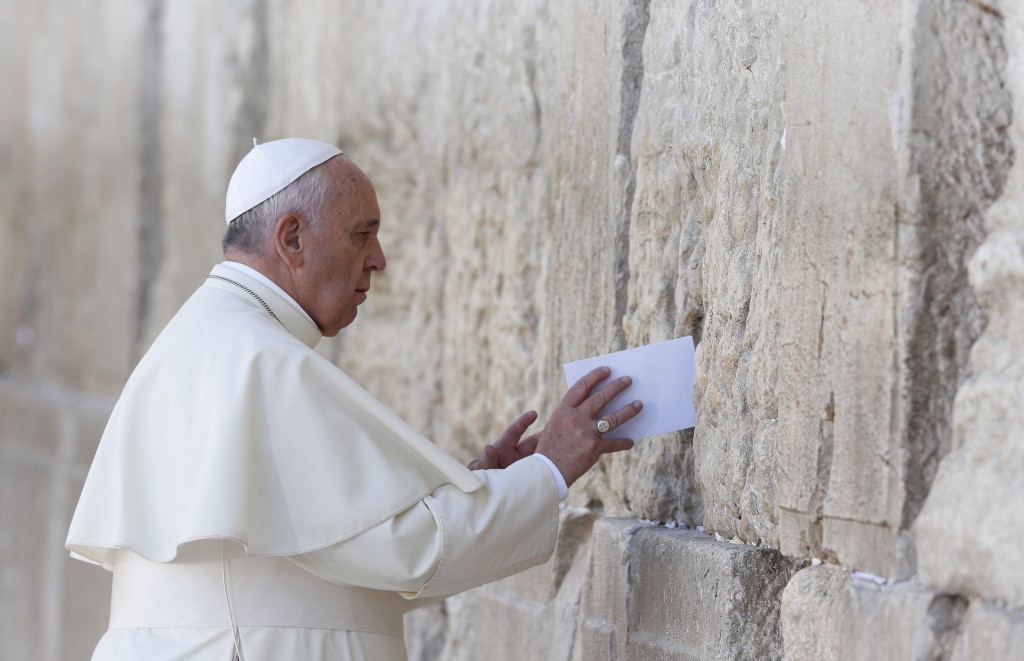
JERUSALEM — The leader of the world’s 1.2 billion Catholics arrived in this ancient city May 25 to find buildings bedecked with papal flags and huge banners proclaiming “Welcome to the Holy Land, Pope Francis!”
In Bethlehem Square earlier in the day, the pontiff issued a surprise invitation to President Shimon Peres of Israel and Palestinian President Mahmoud Abbas to join him at the Vatican to pray for peace. Both men immediately accepted the invitation and traveled to the Vatican to meet and pray with the pontiff June 8.
Lauded by Christians, Jews and Muslims, Pope Francis is inarguably an inspiration to those of various faiths who welcomed him to a city revered as the holiest site in Christianity, Judaism and Islam. Throughout the city and elsewhere in the region, The Catholic Sun spoke with people on the street regarding their impressions of the pontiff.
Abu Rabia Ali, a Muslim who served as a tour guide for a group of Catholic journalists in Israel for the papal visit, said he felt the pope was a man of goodwill who would help foster peace in the region.
“We pray for peace here,” Ali said. “If we have peace, it’s paradise for everyone.”
Liliana Walter, a Jewish woman from Argentina, was visiting the Jordan River with her family a few days after the papal visit. Walter said Pope Francis was beloved in Argentina and that his visit to Israel was “exciting and spectacular.”
“He was a different sort of priest,” Walter said. “He knows about people’s problems, he knows what affects them. He has respect for everyone.”
Brother Jean Michele, a Benedictine monk in Abu Gosh, a town west of Jerusalem, said the pontiff’s visit touched the heart of the people and inspired hope.
“When God wants, with the help of the Holy Spirit, there will be a beautiful fruit of peace coming from this trip,” Br. Jean Michele said. “As Catholic monks living on this land, we wait in hope with everybody and we try to let the Holy Spirit strengthen this hope.”
Spiritual, not political
Maher Canawati, a Christian who serves on the city council for Bethlehem, said the pope’s visit raised hopes among Palestinians that the wall of separation Israel began building in 2000 would eventually be demolished. Pope Francis made an unexpected stop at the wall and prayed silently May 25.
Israel contends it built the barrier as means of preventing terrorist attacks but those who live in Bethlehem say it has caused considerable hardship.
The pope’s prayer at the wall “did a lot to support Palestinians,” Canawati said. “To see the pope telling the whole world that this is wrong, we’re praying against it — it feels good.”
Rabbi Avraham Skorka, a close friend of Pope Francis, cautioned against drawing political conclusions from the pope’s prayer at the security barrier. Pope Francis, he said in an interview with The Jerusalem Post, is a deeply prayerful man who also prayed at the Mount Herzi memorial for an end to terrorism.
Ruad Halak, a Palestinian and a Muslim who runs a small coffee shop in Jerusalem, said the visit of Pope Francis to Israel was a blessing.
“I think it’s very good for us,” Halak said. “His visit to the mosque and the meeting for the Muslim families…it means this man wants to make peace in our country here. And I hope he will.”
During his visit to Israel, the pope visited Yad Vashem, a massive museum in Jerusalem built as a memorial to the 6 million victims of the Holocaust. The multi-media displays at the site offer a heartbreaking look at the murderous Nazi regime that sought to extinguish Jews from the earth.
Pope Francis met with Israel’s president, Shimon Peres, May 26 at the presidential palace where a choir of 120 Jewish, Christian and Muslim children sang for the two leaders.
President Peres told the crowd that the pontiff’s visit to Israel was an important opportunity to pray for peace and that “children will grow without danger to their lives.” Threats of war will not bring peace, Peres said. “Only peace has the power to uproot poverty and overcome despair.”
Pope Francis renewed his plea that people of all faiths work together tirelessly and tenaciously to achieve peace.
“Peacemaking demands first and foremost respect for the dignity and freedom of every human person, which Jews, Christians and Muslims alike believe to be created by God and destined to eternal life,” Pope Francis said.







